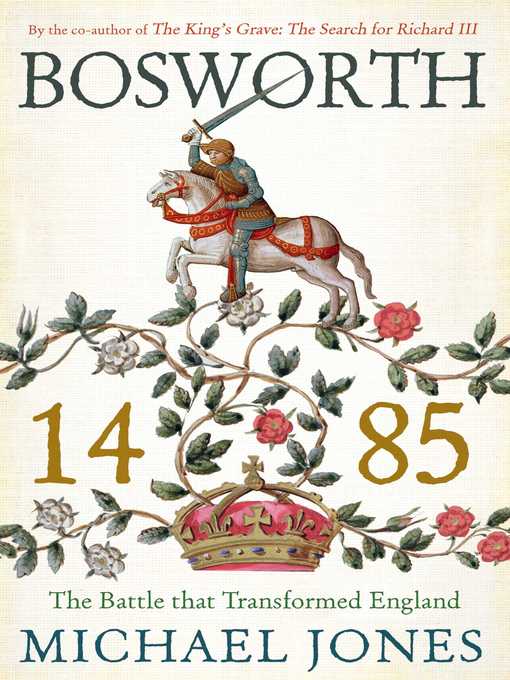
Bosworth 1485
کتاب های مرتبط
- اطلاعات
- نقد و بررسی
- دیدگاه کاربران
نقد و بررسی

July 6, 2015
British historian Jones (The King’s Grave) draws on the discovery of King Richard III’s bones and other archeological finds to provide new information on the Bosworth site in this update to his study of the battle that ended the Plantagenet dynasty in England. Jones’s goal is to “turn Shakespeare’s text on its head,” and to do this he revisits the known facts of Richard’s life, interpreting them according to his own view of medieval values. The result is a classic example of psycho-history, a form popular in the 1970s but long ago discarded. Jones sees Richard as a man scarred by the battle deaths of his father and brother, and he portrays Richard as devoted to his powerful mother, Cecily Neville. Taking as fact the rumor that Neville’s elder son, King Edward IV, was the product of an affair, Jones concludes that Richard believed himself to be upholding dynastic honor and that his army shared that belief. But many of Jones’s conclusions have no citations, as he claims the book is intended for the “general reader” and that academic truth “is not ultimately important.” General readers may feel patronized by the author’s comparison of contemporary and “medieval” attitudes; those seeking a clear study of Richard and Bosworth may simply feel annoyed. Agent: Jason Bartholomew, Hodder (U.K.).

June 15, 2015
Jones (coauthor, The King's Grave: The Search for Richard III) presents a brilliant rethinking of Richard III of England (1452-85), whose reign ended at the bloody Battle of Bosworth, the decisive fight in the Wars of the Roses. Richard III, whose remains may have been found under a Leicester, England parking lot in 2012, is best known through the eponymous play by William Shakespeare. Here, Jones engages directly with the Shakespearean text to consider the postmortem mythologizing of Richard by the Tudor dynasty during Shakespeare's lifetime. This account makes the Battle of Bosworth the hub of a wide-ranging discussion of Richard along with the York and Tudor clans, urging readers to consider not only Richard but his peers in light of contemporary mores rather than anachronistic modern ones. A highlight of the book is the author's assemblage of the geography of the battlefield itself; Jones details previous theories and walks readers through his preferred construction. Full notes, a time line, maps, and an index are valuable adjuncts to the text. VERDICT Anyone interested in military history will appreciate this vivid and well-written reconsideration of a major military encounter, while those with an interest in the English monarchy will value this new light cast on a notably dim figure.--Hanna Clutterbuck, Harvard Univ. Lib., Cambridge, MA
Copyright 2015 Library Journal, LLC Used with permission.

June 1, 2015
The 2012 discovery of Richard III's remains produced a flurry of accounts of the famous Shakespearean villain whose short reign ended in the battle that launched the Tudor dynasty. In this latest, British historian Jones (After Hitler: The Last Days of the Second World War in Europe, 2015, etc.) rocks no boats and agrees with most modern scholars that Richard (1452-1485) was not such a bad fellow. Richard III lived during the War of the Roses, a highly unstable, violent period in British history. His father died in battle in 1460 after almost achieving the crown, which went to Richard's brother, Edward IV, who reigned from 1461 to 1483. Richard served him more or less loyally until his death, when he revived an old accusation that Edward was illegitimate, making Richard himself the legitimate heir. Enjoying considerable support among the nobility and parliament, he was crowned three months later. Despite the absence of proof, most scholars believe Richard murdered Edward's sons ("the princes in the Tower"), but killing rival claimants, even as children, was not unknown in that era. Another rival, Henry Tudor (later Henry VII), had only a distant claim; his bumbling invasion and shocking victory against superior forces continue to bewitch historians. Jones tries his hand, and the result depends heavily on speculation, hints from contemporary documents, and parallels with other medieval battles. This is unavoidable due to the dearth of evidence. The location of the battlefield itself remains controversial; new findings reveal that Richard was not severely hunchbacked but do not answer major questions. "It is a more untidy and unsettling reality than the caricature with which we are familiar," writes the author. An admirable, mildly revisionist update on a widely misunderstood king.
COPYRIGHT(2015) Kirkus Reviews, ALL RIGHTS RESERVED.

























دیدگاه کاربران